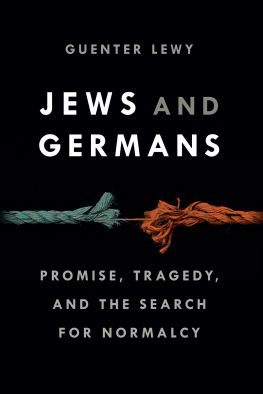E RICH K AHLER originally wrote The Germans as a series of lectures on German cultural history. He delivered these lectures while teaching at Cornell University in 19511952, and in 19551956 he again presented the material under the auspices of the Lord Simon Lectureship at the University of Manchester. In June 1969, he began preparing the manuscript for publication. At the time of his death a year later, he had revised the first eighteen lectures; these are chapters one through fourteen of the present book.
The Germans draws on materials and develops certain themes that appeared in Kahlers earlier work, Der deutsche Charakter in der Geschichte Europas (Zrich: Europa Verlag, 1937); but the second book is not merely a translation of the first. Der deutsche Charakter in der Geschichte Europas is an attempt to define the German character as manifested in European history. Kahlers approach in this study is not chronological but topical: how, he asks, does the German character express itself in German intellectual life, in the growth of the German cities, in the German economy. These concerns are reiterated in The Germans . This work, too, is a characterological study that offers highly personal interpretations. Kahlers basic assumption is that a nation, just like an individual, is possessed of a distinct character and that it, too, proceeds in its growth from childhood to maturity. He argues that what makes Germany unique among the major European nations is that she did not experience normal growth and never achieved anything like maturity. She never, he asserts, progressed beyond a protracted puberty, an endless becoming ( Der deutsche Charakter , p. 41), and achieved national coherence only in the intellectual realm but never in the political one.
The reader who knows Der deutsche Charakter will find him-self on familiar ground in the present book. Not only are the central themes identical, but many passages from the earlier study, often abbreviated and reworked, have been incorporated into the later one: the outline of Prussian history, the account of the Germanic tribes and of their encounter with Roman civilization, the long section on the growth of the German cities. The thesis of the Luther section in The Germans also goes back to the earlier book, but there Kahler does not present such a detailed account of the Reformation or of Luthers career.
Sharing themes and a certain amount of material, the two books cannot help sharing in the element of polemic. Kahler wrote Der deutsche Charakter during the last years of the Weimar Republic, and the distress he felt over political developments in Germany is clearly evident in that volume, so evident that when he submitted the manuscript to a Munich publisher, an editor sympathetic to the Nazi cause denounced Kahler to the party. Shortly after the elections of 1933, the police searched Kahlers home for the manuscript but failed to find it. Kahler was in Austria at the time and never returned to Germany. The manuscript was later smuggled to him in Zrich, where he lived until he emigrated to the United States in 1938. In view of these circumstances, it is not surprising that the polemical tone became even sharper when Kahler wrote of the German character again in 19511952.
But despite the similarities that exist between these two studies, there is also one crucial difference. Der deutsche Charakter investigates the phenomenon of the German character from a number of perspectives. The book is a reflective, philosophical one that walks around its subject and focuses on it ever more sharply from all the vantage points Kahlers broad learning let him assume. The Germans , on the other hand, was conceived as a series of lectures for undergraduate students. While Kahler wanted to illuminate the same problems he had dealt with in Der deutsche Charakter , he also wanted to narrate the history of the German people. He therefore organized the second book chronologically rather than topically, presenting a cultural history of the Germans from the Great Migrations up to World War II and including in it much basic information that had no place in the earlier study.
In editing the manuscript, we were able to shorten it considerably by omitting the recapitulation at the beginning of each lecture and by eliminating other repetitions that were doubtless useful in the context of a lecture series but that are unnecessary in print. Since it was impossible to locate all the sources quoted throughout the book, we decided to dispense with documentation altogether. The brief bibliography contains titles Erich Kahler himself provided as well as a number of more recent studies of general interest. Unless otherwise noted, the translations of quoted texts are Erich Kahlers.
We are grateful to Alice Kahler for providing us with the information on the publishing history of Der deutsche Charakter and on the history of the manuscript for The Germans .
R OBERT K IMBER
R ITA K IMBER
Deutschland? aber wo liegt es? Ich weiss das Land nicht zu finden . Wo das gelehrte beginnt, hrt das politische auf .
Germany? But where is it? I cannot find such a country . Where erudition begins, politics comes to an end .
F RIEDRICH V. S CHILLER Das Deutsche Reich, Xenien












